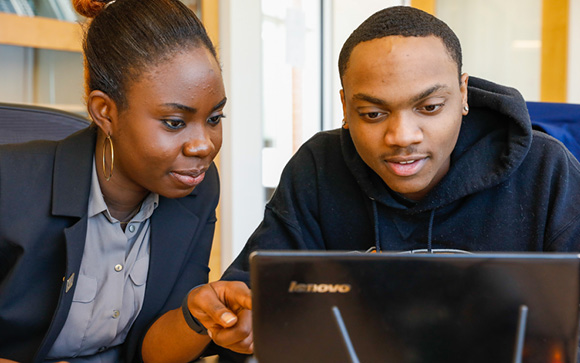The technology that has empowered businesses amid a massive digital shift in society can also help to lift up economies around the world.
A new program that will bring together college students from universities in Maryland and South Africa is aiming to spread those technology and entrepreneurship skills among a new generation of leaders, so they in turn can make an impact in marginalized communities.
Through the Entrepreneurial and Technological Empowerment Program (ETEP), business students from Bowie State University, a Maryland HBCU, and Rhodes University in South Africa will work together on new tech-based solutions that can support economic growth among rural and emerging businesses. The program is launching in the spring of 2022.
The course will introduce students at both universities to technologies that can help businesses in fintech, blockchain and other emerging tech areas, including cross-border payments or digital currency. In turn, leaders aim to make the connection between that tech and how it helps businesses. Lessons will include best practices in lean startup practices, such as Agile project management.
With students from both universities paired in this work, the leaders then plan to empower the students to create solutions for rural cooperatives in the Makhanda region of South Africa, where Rhodes is based.
“Our goal is that students on both sides of the globe get into the community, understand what the challenges are and get something bigger than a class or bigger than a project,” said Andrew Mangle, an assistant professor in the department of management information systems and a key organizer on ETEP.
The universities bring complementary expertise: Bowie State is growing its technology and entrepreneurship education offerings, while Rhodes has expertise in sustainable business development. Working with the rural cooperatives, the experiential learning can not only help students to gain an understanding of life in the developing world, but also apply what they’ve learned. Mangle said key steps in the entrepreneurial processes will be particularly important: understanding a customer, creating a value proposition and leading with empathy.
They hope the products and solutions developed ultimately serve to connect rural cooperatives with wider opportunity.
“This is about empowering with technology, and empowering them in a way that they can leverage the technology available in a way that they can link themselves to the mainstream businesses of bigger metro areas, as well as global businesses,” said Kavita Kapur, a lead organizer for ETEP at BSU who is an assistant professor of marketing, management and public administration.
These skills could then also be applied in other areas, such as with small and family-owned businesses in the US.
“We are hoping that through this students will pick up competencies and skills which will allow them to work in any situation which is global,” Kapur said.
Here’s how it will work: BSU will introduce a 16-week course in the spring semester, with the last eight weeks devoted to the collaborative ETEP module. Working in a virtual classroom, the students will work in teams to support a rural cooperative. In 2022, there will be a two-week exchange visit for students from Rhodes to the US, pandemic dependent. In turn, Bowie State students will travel to South Africa in 2023.
As the program gets up and running, they’re still seeking partners — those who want to get involved with “a bunch of eager students and faculty on both sides of the globe trying to work together to solve problems and make things better, specifically for underserved and underrepresented populations,” Mangle said.
Before you go...
Please consider supporting Technical.ly to keep our independent journalism strong. Unlike most business-focused media outlets, we don’t have a paywall. Instead, we count on your personal and organizational support.
Join our growing Slack community
Join 5,000 tech professionals and entrepreneurs in our community Slack today!

Entrepreneurship is changing, and so is the economic development behind it

Tech Hubs’ new $210M funding leaves Baltimore and Philly off the table

Here’s what to know before using AI to craft your brand’s social media posts


